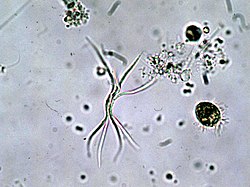Ankistrodesmus
| Ankistrodesmus | |
|---|---|

| |
| Ankistrodesmus falcatus | |
| Scientific classification | |
| Clade: | Viridiplantae |
| Division: | Chlorophyta |
| Class: | Chlorophyceae |
| Order: | Sphaeropleales |
| Family: | Selenastraceae |
| Genus: | Ankistrodesmus Corda |
| Type species | |
| Ankistrodesmus fusiformis Corda[2]
| |
| Species[1] | |
|
See text | |

Ankistrodesmus is a genus of green algae in the family Selenastraceae.[1] It is one of the most common types of phytoplankton in freshwater habitats around the world.[3] The name Ankistrodesmus comes from the Greek roots ankistron, meaning "cross", and desmos, meaning "bond".[4]
Description
[edit]Ankistrodesmus forms colonies of cells, usually found as loose bundles or tufts of cells. Sometimes the cells may twist around each other in the colony. Cells are many times longer than wide, and are variously needle-shaped, sickle-shaped, or sigmoid in outline. They contain a single chloroplast; the chloroplast usually contains a single pyrenoid, but may contain none or several pyrenoids.[3]
Life cycle
[edit]Reproduction occurs asexually; sexual reproduction is unknown in Ankistrodesmus. It exclusively forms autospores, and does not appear to have a flagellated stage in its life cycle.[2]
Some strains of Ankistrodesmus have been observed to undergo programmed cell death. The evolutionary role of this process is unknown.[5]
Identification
[edit]Ankistrodesmus is chiefly distinguished from the similar genus Monoraphidium in its habit: Ankistrodesmus forms colonies, while Monoraphidium is found as single cells.[6] Meanwhile, Selenastrum differs in having more strongly curved cells.[2] The distinctions between the genera are artificial, since they do not correspond with monophyletic groupings;[7] occasionally, Ankistrodesmus is found as single cells.[6] Other similar genera include Keratococcus and Elakatothrix.[3]
Identification of species chiefly depends on details of the size and shape of cells.[2] However, a molecular phylogenetic study has shown evidence of considerable cryptic diversity.[8]
Uses
[edit]Some strains of Ankistrodesmus are promising candidates for biodiesel production, or for producing fatty acids on a commercial scale.[9]
Species
[edit]- A. acerosus
- A. acutissimus
- A. amalloides
- A. antarcticus
- A. arcticus
- A. bernardensis
- A. bernardii
- A. caribeum
- A. chlorogonioides
- A. cucumiformis
- A. densus
- A. dulcia
- A. dybowskii
- A. ecsediensis
- A. extensus
- A. falcatus
- A. falciformia
- A. fasciculatus
- A. flexuosus
- A. fractus
- A. fusiformis
- A. gracilis
- A. hindakii
- A. komarekii
- A. lacuster
- A. marinus
- A. minutus
- A. nannoselene
- A. nivalis
- A. pehrii
- A. polymorphus
- A. pseudosabulosum
- A. pyrenogerum
- A. quaternus
- A. rhaphidioides
- A. selenastrum
- A. septatus
- A. sigmoideus
- A. spiralis
- A. spirochromus
- A. stipitatus
- A. tjibodensis
- A. tortus
- A. turneri
- A. viretii
References
[edit]- ^ a b Guiry, M.D.; Guiry, G.M. (2018). "WoRMS taxon details". Guiry, M.D. & Guiry, G.M. (2018). AlgaeBase. World-wide electronic publication, National University of Ireland, Galway (taxonomic information republished from AlgaeBase with permission of M.D. Guiry). Retrieved 2018-11-23.
- ^ a b c d Guiry, M.D.; Guiry, G.M. "Ankistrodesmus". AlgaeBase. World-wide electronic publication, National University of Ireland, Galway. Retrieved 2023-06-01.
- ^ a b c Bicudo, Carlos E. M.; Menezes, Mariângela (2006). Gêneros de Algas de Águas Continentais do Brasil: chave para identificação e descrições (2 ed.). RiMa Editora. p. 508. ISBN 857656064X.
- ^ Shayler, Hannah; Siver, Peter A. (2004). "Ankistrodesmus". Carolina Lucid Key to Freshwater Algae. Connecticut College. Retrieved 2024-11-28.
- ^ Barreto Filho, Marcelo M.; Vieira, Helena H.; Morris, J. Jeffrey; Bagatini, Inessa L. (2022). "Species-specific effects and the ecological role of programmed cell death in the microalgae Ankistrodesmus (Sphaeropleales, Selenastraceae)". Biology Letters. 18 (10). doi:10.1098/rsbl.2022.0259. PMC 9579752. PMID 36259168.
- ^ a b Matthews, Robin A. (2016). "Freshwater Algae in Northwest Washington, Volume II, Chlorophyta and Rhodophyta". A Collection of Open Access Books and Monographs. Western Washington University. doi:10.25710/fctx-n773.
- ^ Krienitz, Lothar; Ustinova, Iana; Friedl, Thomas; Huss, Volker A. R. (2001). "Traditional generic concepts versus 18S rRNA gene phylogeny in the green algal family Selenastraceae (Chlorophyceae, Chlorophyta)". Journal of Phycology. 37 (5): 852–865. doi:10.1046/j.1529-8817.2001.01004.x. S2CID 84625065.
- ^ Fawley, Marvin W.; Dean, Michelle L.; Dimmer, Stephanie K.; Fawley, Karen P. (2006). "Evaluating the Morphospecies Concept in the Selenastraceae (Chlorophyceae, Chlorophyta)". Journal of Phycology. 42: 142–154. doi:10.1111/j.1529-8817.2006.00169.x. S2CID 53318143.
- ^ Yee, Willy (2016). "Microalgae from the Selenastraceae as emerging candidates for biodiesel production: A mini review". World Journal of Microbiology and Biotechnology. 32 (4): 64. doi:10.1007/s11274-016-2023-6. PMID 26931604. S2CID 255143072.
